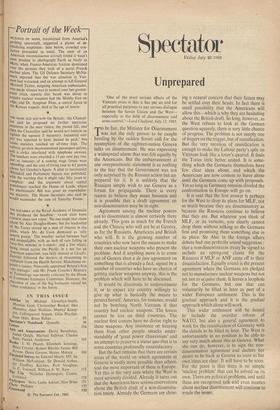Unprepared
'One of the most serious effects of the Vietnam crisis is that it has put an end for all practical purposes to any serious dialogue between the Soviet Union and the West— especially in the field of disarmament and arms control.'--Lord Chalfont, July 13, 1965.
rri0 be fair, the Minister for Disarmament I was, not the only person to be caught bending by the sudden Soviet call for the resumption of the eighteen-nation Geneva talks on disarmament. He was expressing a widespread alarm that was felt equally by the Americans. But the embarrassment at one overpessimistic statement is as nothing to the fear that the Government was not only surprised by the Russian action but un- prepared for it. It is unlikely that the Russians simply wish to use Geneva as a forum for propaganda. There is every reason to believe they mean business and it is possible that a draft agreement on non-dissemination may be in sight.
Agreement among the nuclear powers not disseminate is almost certainly there already. This goes as much for the French and the Chinese who will not be at Geneva, as for the Russians, Americans and British who will. It is the growing number of countries who now have the means to make their own nuclear weapons who present the problem. And if anything more is to come out of Geneva than a de jure agreement on something that is already a fact, signed by a number of countries who have no chance of getting nuclear weapons anyway, this is the problem which will have to be discussed.
It would be disastrous to underestimate it, or to expect any country willingly to give up what is basically the means to protect herself. America, for instance, would not be bombing North Vietnam if that country had nuclear weapons. The lesson cannot be lost on third countries. The nuclear first comers have no divine right to these weapons. Any insistence on keeping them from other people smacks under- standably of 'great power chauvinism' and an attempt to preserve a status quo that is to some countries profoundly unsatisfactory. But the fact remains that there are certain areas of the world on which agreement at Geneva is vastly more possible than others, and the most important of these is Europe. Yet this is the very area where the West is most seriously divided. Already it turns out that the Americans have serious reservations about the British draft of a non-dissemina- tion treaty. Already the Germans are show- ing a natural concern that their future may be settled over their heads. In fact there is small possibility that the Americans will allow this—which is why they are hesitating about the British draft. So long, however, as the West refuses to look at the German question squarely, there is very little chance of progress. The problem is not simply one of fingers on the trigger, but of reunification. But the very mention of reunification is enough to make the Labour party's split on Vietnam look like a lover's quarrel. It finds the Tories little better united. It is some- thing which the Germans themselves have few clear ideas about, and which the Americans are now content to leave alone until the Germans come up with proposals. Yet so long as Germany remains divided the confrontation in Europe will go on.
It, is said that the first answer is perhaps for the West to drop its plans for MLF, not so much because they are disseminatory as because the Russians continue to believe that they are. But whatever you think of MLF, or its variants, you clearly cannot drop them without talking to the Germans first and promising them something else in its place. Sir Alec in the foreign affairs debate had one perfectly sound suggestion : that a non-dissemination treaty be signed to include an opting-out clause for the Russians if MLF or ANF came ,off to their dissatisfaction. Equally sound is the present agreement where the Germans are pledged not to manufacture nuclear weapons but not yet not to acquire them. It leaves a loophole for the Germans, but one that can voluntarily be filled in later as part of a wider European settlement. This is the gradual approach and it is the gradual approach which alone will work.
This wider settlement will be bound to include the overdue reform of NATO, but also a general agreement to work for the reunification of Germany with the details to be filled in later. The West is unfortunately in no position to be able to say very much about this at Geneva. What she can do, however, is to sign the non- dissemination agreement and declare her desire to be back at Geneva as soon as her own ideas are clear. It will have to be soon. For the point is that there is no simple 'nuclear problem' that can be solved on its own. There are political problems, and until these are recognised talk and even treaties about nuclear disarmament will continue to evade the issues.














































 Previous page
Previous page